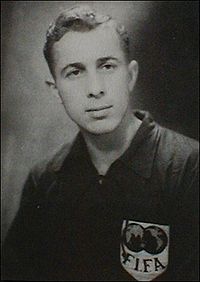On this day, Bajdo Vukas died age 55
On this day April 4th 1983, aCroatian football player died, legendary of all time Bajdo Vukas.
Bernard “Bajdo” Vukas played as a left winger forward and is mostly remembered for his extraordinary dribbling ability. In 2000, he was voted by the Croatian Football Federation as the best Croatian player of all Time, and in a poll by Večernji List, he was voted the best Croatian athlete of the 20th century.
Vukas started his career in the youth ranks of Concordia Zagreb. After WW2, he spent some time in NK Amater Zagreb before moving to Hajduk Split in 1947. He stayed in Hajduk until 1957, playing 202 games and scoring 89 goals. With Hajduk, Vukas won theYugoslav First League title on three occasions, in 1950, 1952 and 1955, and he was the league’s top scorer in the 1954–55 season with 20 goals. In 1950, Vukas helped Hajduk win the Yugoslav First League undefeated, a record which has never been broken.
In 1957, he moved to Bologna F.C. 1909, where he stayed for two years playing 48 games and scoring two goals, but his time there was overshadowed by serious illness. He returned to Hajduk in 1959 and remained until 1963, playing 65 games and scoring 5 goals. He spent his last days as a football player in Austria, playing for Austria Klagenfurt,Grazer AK and Kapfenberger SV.
Counting friendlies, Vukas played a total of 615 games for Hajduk Split and scored 300 goals.
On 23 October 1953, Vukas, along withBranko Zebec, Vladimir Beara andZlatko Čajkovski, played for FIFA’s ‘Rest of the World’ team against England atWembley – in a match to celebrate 90 years of English Football Association. The match ended 4–4, with Vukas assisting in two goals and being awarded penalty. Two years later, on 13 August 1955, Vukas was invited to play for the UEFA Team in a friendly match against Great Britain played in Belfast, where Vukas scored a hatrick.
With Yugoslavia he won 2 silver medals in the Olympic games.
He died on 4 April 1983, aged 55. After his legacy, remembering his talent there are streets in Split and Zagreb named after him.




